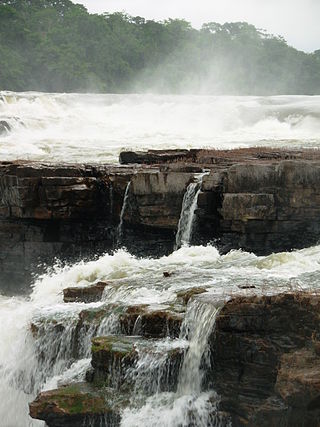Location
The park lies in the Amazon biome. It covers 376,813 hectares (931,130 acres). It was established on 29 April 1998, and is administered by the Chico Mendes Institute for Biodiversity Conservation. The park covers parts of the municipalities of Barcelos, Amazonas and Caracaraí, Roraima. It adjoins the Yanomami Indigenous Territory to the north.
The north west of the park has a complex of mountains isolated from other ranges of the Guianas. Altitudes range from 100 to 1,700 metres (330 to 5,580 ft). It contains small meandering streams covered by upland forest, wetlands, rivers with distinctive chemical and biological properties (the Catrimani River and Água Boa do Univini River) and alluvial floodplains. Some of the wetlands are strictly seasonal in nature. Average annual rainfall is 2,000 metres (6,600 ft). Temperatures range from 24 to 36 °C (75 to 97 °F) with an average of 28 °C (82 °F).

The Jaú National Park is a national park located in the state of Amazonas, Brazil. It is one of the largest forest reserves in South America, and part of a World Heritage Site.

Pico da Neblina National Park is a national park in the state of Amazonas in the north of Brazil, bordering on Venezuela. It overlaps with several indigenous territories, which creates tensions over land use, as does the military presence due to the border location. The park includes lowlands around the Rio Negro, partly flooded, and mountains that include the highest peak in Brazil, after which the park is named. The wide variety of physical environments supports great biodiversity, including several endangered species.

The Cabo Orange National Park is a National park located in Amapá state in the north of Brazil, near the border between Brazil and French Guiana.

Serra Geral National Park is a national park in the states of Rio Grande do Sul and Santa Catarina, Brazil.

The Serra do Pardo National Park is a National park in the state of Pará, Brazil.

Serra do Itajaí National Park or Itajaí Mountains National Park is a national park in the state of Santa Catarina, Brazil.
Serra da Cutia National Park is a national park in the state of Rondônia, Brazil.

Viruá National Park is a national park in the state of Roraima, Brazil. It protects an area with very infertile sandy soil, periodically flooded, that has no economic value but has exceptionally high biodiversity.

Anavilhanas National Park is a national park that encompasses a huge river archipelago in the Rio Negro in the state of Amazonas, Brazil. It is part of a World Heritage Site.
Caracaraí Ecological Station is an ecological station in the state of Roraima, Brazil.
Juami-Japurá Ecological Station is an ecological station in the municipality of Japurá, Amazonas, Brazil.

Juruena National Park, declared in 2006, is the third largest national park of Brazil. It is located along the Juruena River, in the north of Mato Grosso state and the south of Amazonas state. It forms part of a corridor of protected areas that is meant to contain agricultural expansion into the Amazon rainforest.
The Roraima National Forest is a national forest in the state of Roraima, Brazil.
The Amazonas National Forest is a national forest in the state of Amazonas, Brazil.

Rio Novo National Park is a national park in the state of Pará, Brazil.

Terra do Meio Ecological Station is an ecological station (ESEC) in the state of Pará, Brazil.

The Campos Amazônicos National Park is a National park in the states of Rondônia, Amazonas and Mato Grosso, Brazil.

The Guaricana National Park is a national park in the state of Paraná, Brazil. It protects a mountainous area holding a remnant of Atlantic Forest.

The Médio Juruá Extractive Reserve is an extractive reserve in the state of Amazonas Brazil.

The Yanomami Indigenous Territory is an indigenous territory in the states of Amazonas and Roraima, Brazil. It overlaps with several federal or state conservation units. It is home to Yanomami and Ye'kuana people. There are ongoing conflicts with an overlapping national forest in which mining was permitted.
This page is based on this
Wikipedia article Text is available under the
CC BY-SA 4.0 license; additional terms may apply.
Images, videos and audio are available under their respective licenses.
















